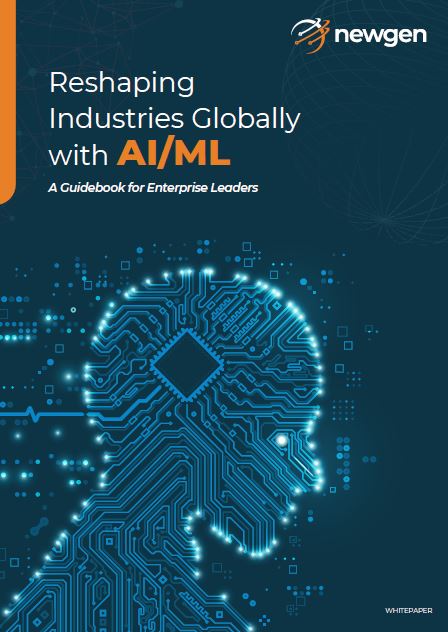Why AI/ML Has Moved Beyond Hype?
Conversations about Artificial Intelligence (AI) and Machine Learning (ML) have shifted dramatically. What was once hype and curiosity is now serious enterprise strategy. According to recent surveys, nearly one-third of companies have integrated Generative AI (GenAI) into at least one business function, signaling broad acceptance of AI as a viable growth and innovation driver.
The global AI market surpassed $196 billion in 2023 and is projected to exceed $107 billion annually by 2028. With cost-effective computing power and unprecedented data availability, AI and ML have become essential for organizations that want to remain competitive, innovate faster, and operate efficiently.
Why AI/ML Adoption Is Surging?
AI and ML are transforming industries by enabling smarter, faster, and more personalized operations.
- Better Customer Service
AI-powered chatbots and digital assistants respond instantly, personalize interactions, and improve customer satisfaction. - Smarter Decision-Making
AI helps leaders process massive data volumes quickly to predict trends, spot opportunities, and make informed, cost-effective decisions. - Automating Mundane Tasks
From data entry to process documentation, AI excels at repetitive work, freeing employees to focus on high-value tasks, reducing errors, and improving turnaround time. - Accessible Innovation
The democratization of AI affordable computing, open-source frameworks, and low-code platforms empowers organizations across industries to integrate advanced intelligence into their operations.
Challenges Organizations Face
Despite the clear benefits, companies encounter barriers when trying to modernize with AI/ML:
- Disjointed and siloed functions Legacy departmental structures block smooth data and process flow.
- Manual, paper-driven processes Slow and error-prone operations create bottlenecks.
- Rigid legacy systems Old tech stacks can’t scale or integrate with modern AI solutions easily.
- Technology trust gaps Customers worry about security, transparency, and ethical AI use.
- Information overload Unstructured data (documents, images, videos) makes compliance and analytics difficult.
To overcome these barriers, enterprises need flexible, unified platforms and clear governance frameworks for AI adoption.
The Global Economic Impact of AI
AI is poised to add trillions to global GDP by 2030:
- China: $7 trillion (26% of GDP)
- North America: $3.7 trillion (14.5% of GDP)
- Northern & Southern Europe: $2.5 trillion combined
- Developed Asia: $1.2 trillion
This economic acceleration comes from automation, productivity boosts, improved decision-making, and new revenue streams.
AI/ML Applications Across Industries
Healthcare Predictive Disease Diagnosis
- Analyze medical histories, genetic profiles, and diagnostic results to detect diseases earlier.
- Personalize treatment plans and improve patient outcomes.
Media & Entertainment Personalized Content Recommendations
- Platforms like Netflix use AI/ML to recommend content, enhancing user engagement and retention.
Service Providers Predictive Maintenance
- Forecast equipment failure using sensor data and historical performance, reducing downtime and cost.
Retail Predictive Customer Behavior
- Segment shoppers, forecast buying patterns, and send targeted offers to build loyalty and drive revenue.
These examples illustrate how AI/ML is reshaping industry standards, driving innovation, and creating competitive advantages across verticals.
Solving the Compliance & Trust Challenge
For sustainable AI adoption, organizations must focus on:
- Real-time risk and exception management with system-driven escalations.
- Transparent communication about AI’s role and benefits to ease user concerns.
- Dynamic compliance adaptation with configurable business rules.
- Robust security and access control to protect sensitive data.
With these measures, businesses can balance innovation with trust and regulatory alignment.
Strategic Implementation of AI/ML
To integrate AI/ML effectively, leaders should:
- Evaluate readiness Assess current data maturity, workflows, and infrastructure.
- Break silos Connect processes and data sources for better insight generation.
- Build governance and ethical frameworks Ensure explainable, bias-free, and auditable AI.
- Invest in scalable, low-code platforms Accelerate AI deployment with minimal technical barriers.
- Promote cross-functional collaboration Involve business, IT, and compliance teams for success.
Research shows 50% of strategic planning activities could be automated, yet only 15% currently are indicating a huge opportunity to scale AI impact.
How Newgen Simplifies Enterprise AI Adoption?
Newgen’s AI/ML Data Science Platform accelerates and simplifies enterprise AI implementation with:
- End-to-End Integration Seamlessly manage the full AI/ML lifecycle from data preprocessing to model deployment in one platform.
- Comprehensive Functionality Pipelines, workflows, and advanced analytics built in.
- Low-Code Accessibility Drag-and-drop interface makes AI creation easier for non-technical users.
- Cross-Team Collaboration Facilitate knowledge sharing between data scientists, IT, and business users.
- Continuous Optimization Built-in monitoring, retraining, and version control for adaptable AI models.
With Newgen, businesses can deploy AI faster, reduce time-to-market, and innovate confidently while ensuring transparency and control.
Why Acting Now Matters?
AI and ML are no longer optional for growth-driven organizations. Early adopters are already seeing measurable gains from cost reduction and productivity improvement to revenue acceleration and enhanced customer experience. Delaying adoption risks competitive stagnation and operational inefficiency.
By embracing AI/ML with a secure, low-code, and collaborative platform, enterprises can scale intelligence across processes, win customer trust, and future-proof their digital strategy.

